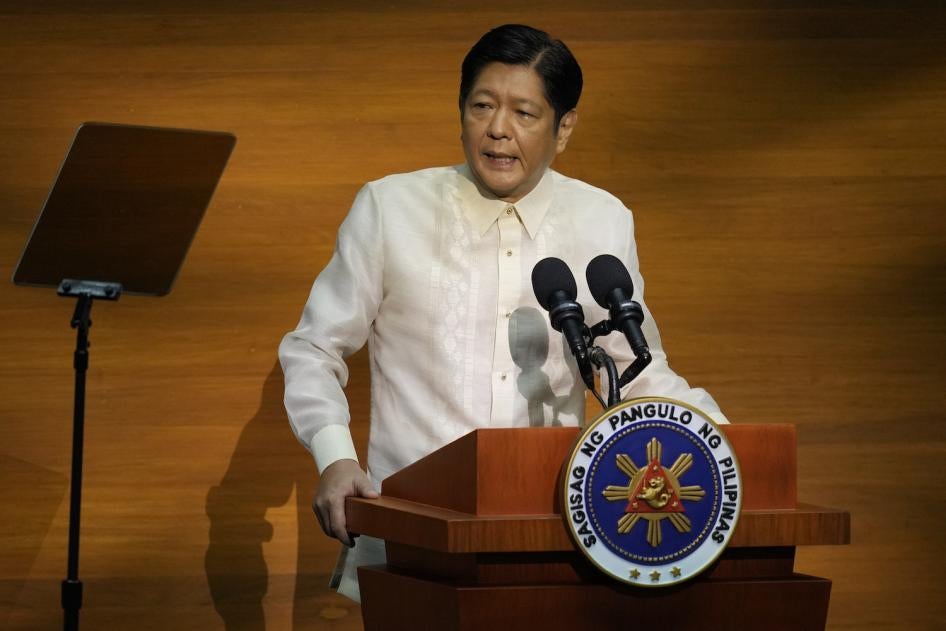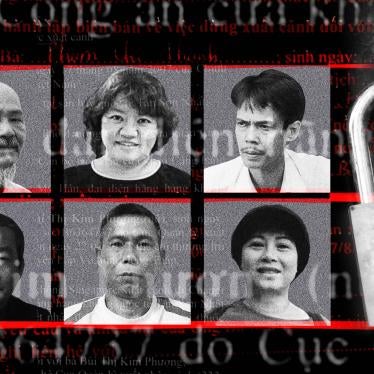(New York) – President Ferdinand Marcos Jr. will mark his first year in office on June 30, 2023, having done little to improve human rights protections in the Philippines, Human Rights Watch said today. Marcos took over from Rodrigo Duterte, whose administration left a legacy of attacks on leftist, environmental and Indigenous activists, a crackdown on the media, and thousands of extrajudicial killings linked to its “war on drugs” that could amount to crimes against humanity.
Marcos has done little to address the pending human rights issues. Police and their agents continue their “drug war” killings, though at a lower rate than during the Duterte administration. The authorities remain responsible for extrajudicial killings, enforced disappearances, and arbitrary arrests of activists and outspoken critics. And the baseless prosecutions of former Senator Leila de Lima, who remains in custody, and the journalist Maria Ressa continue.
“President Marcos needs to do more than issue statements about democracy and the rule of law to demonstrate a genuine commitment to human rights,” said Bryony Lau, deputy Asia director at Human Rights Watch. “Without concrete action to break old patterns of abuses and secure accountability for past crimes, his words have little credibility.”
Marcos has tried to assuage foreign governments’ concerns, contending that the Philippines is in good hands under his leadership. In overseas trips and meetings with ambassadors, he has pledged to improve the human rights situation, which diplomats in Manila and officials abroad have lauded.
But few human rights accomplishments are evident, Human Rights Watch said. The UP Third World Studies Center reported on June 26 that there had been 336 “drug-related” killings since Marcos became president, most during law enforcement anti-drug operations. Out of the thousands of cases of drug war killings since 2016, only three have resulted in the conviction of police officers.
Marcos has yet to rescind the orders and other policy statements that underpinned Duterte’s “war on drugs.” He should formally announce an end to the “drug war,” order investigations into officials implicated in illegal killings, and fulfill his promise to use nonviolent means to address illegal drugs. Government agencies should provide adequate and consistent support to the families of “drug war” victims, especially children.
Both government security forces and the communist New People’s Army have been responsible for serious abuses during their decades-long armed conflict. The Marcos administration has increased the dangerous and at times fatal “red-tagging” of activists deemed to be supporting the insurgents. Officials – including Marcos’s vice president, Sara Duterte, who is also the education secretary – have red-tagged journalists, social media users, and teachers. Marcos should stop the red-tagging and other harassment, and order the authorities to locate activists reported missing.
The authorities are still arbitrarily arresting and detaining activists and critics of the government, and at times carrying out enforced disappearances. Victims and witnesses have made credible allegations of torture, mistreatment, and sexual violence. The Philippine National Police, which has a long history of abuse and corruption, has been responsible for many of these abuses.
The Marcos administration has taken no action to end the politically motivated prosecution or even to recommend bail for former senator de Lima, who was arrested in 2017 in retaliation for her investigations into Duterte’s “drug war.” The prosecution brought bogus drug charges and cited witnesses who later recanted their testimony, leading to her acquittal in two of the three cases.
Media freedom in the Philippines is undercut by violence against journalists. Four journalists have been killed over the past year, bringing the number to 179 journalists killed since democratic government was restored in 1986. The government has not intervened in the remaining dubious criminal case against the Nobel Peace Prize laureate Maria Ressa and her team at the news outlet Rappler. A journalist, Frenchie Mae Cumpio, remains behind bars facing criminal charges, apparently to punish her for reporting on rights abuses in the central Philippines.
The Philippines is seeking to secure the renewal of the European Union GSP+ trade benefits, which depend on the government’s compliance with international human rights, labor rights, and environmental standards. The program expires at the end of 2023, and the Philippines will have to reapply to continue to benefit from it. The European Parliament had urged withdrawal of the GSP+ benefits because of lack of progress in the Philippines’ human rights record. Similar concerns have been expressed by EU officials, including most recently by the EU special representative for human rights.
The US government, a major trading partner and military ally, should also more explicitly link future growth in economic and security ties to demonstrable progress on human rights.
The UN Human Rights Council should continue to press the Philippines government to carry out the recommendations of the 2020 and 2022 reports of the UN Human Rights Office, and bring the situation back onto its agenda when it meets in September.
Marcos should order government agencies to cooperate with a possible investigation by the International Criminal Court. While the Duterte administration withdrew from the court’s founding treaty, the Rome Statute, in 2019, the court retains jurisdiction over crimes committed before the withdrawal. The Marcos administration should rejoin the Rome Statute.
“Marcos needs to demonstrate a break from the past and show concrete, measurable progress on human rights,” Lau said. “The Philippines’ international partners should stop getting a runaround from Marcos and settle for nothing less than real change.”







